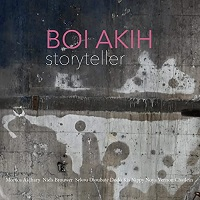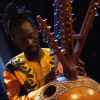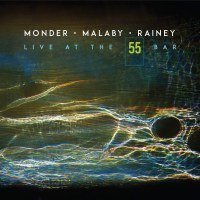Home » Jazz Articles » Album Review » Boi Akih: Storyteller
Boi Akih: Storyteller
A specially designed kora for Malian griot Zoumana Diarra—with additional chromatic strings—graces this album, but sadly Diarra passed away in July 2020, three months before the recording. Honoring Diarra's wish to complete the project, Akihary and Brouwer recruited Guinean kora player Sekou Dioubate, who had to learn the intricacies of the custom-built instrument from scratch. The inspired addition of Hungarian recorder player Dodó Kis—one third of acclaimed recorder trio Axolot—rounds out the quartet, with veteran percussionist Nippy Noya animating half the tracks.
There is contagious joy in songs such as "Anin (wind)" and "Au pawahe (perception)," with Akihary's Haruku-sung lyrics gliding over interweaving guitar, kora and recorder lines, and where solo sparkle gives way to fleet unison motifs. Kis, who switches between soprano, alto, tenor and bass recorders across the ten songs, plays with such free-flowing joie de vivre that it may yet do wonders for recorder sales outside of early music confines. Also arresting is the intricate weave spun by Brouwer and Dioubate, their individual voices occasionally blurring in the cascade of notes, especially when Brouwer plays harp guitar.
Akihary sings in English on "Everything Is Everywhere," a charming animist tale featuring a fluid solo from Brouwer, and on the sung poem "Déjà Vu," a reworking of a song from Liquid Songs (Trytone, 2016), arguably Boi Akih's most experimental album; this version traces the original's abstract terrain before morphing into a slow- grooving African blues, with elegant embellishments. On the hypnotic, gently paced "Dryland," looped vocals conjure choral textures, while Kis' bass recorder evokes solemn church organ chords against a bubbling percussion backdrop.
Another defining element of Boi Akih's idiom is Akihary's wordless singing, heard here to good effect on "Imaginary Journey"—an essentially melodic discourse between voice, guitar and recorder—and "Lost Souls," an atmospheric incantation for voice and guitar. The singer returns to the Haruku language on "Mahina (woman)," a bucolic meditation of caressing lyricism, and "Japala'a (passion)," a cheery marriage of cantering rhythms and crisscrossing melodies. There is tension and release in "Design of Stars and Clouds," which shifts from jig-like effusion to intimate, Joni Mitchell-esque storytelling, with Brouwer bringing a soft, synthesizer-like effect to his nylon strings.
Storyteller is a wonderfully resonant blend of cultures and textures which hails traditions and innovations alike. Akihary and Brouwer have always shown deep respect for tradition but know, too, that without evolution there is stagnation. Above all, however, the music is a tale of ingenuity, loss, resilience and, ultimately, of triumph.
Track Listing
Anin (wind); Au pawahe (perception); Everything is Everywhere; Déjà vu; Dryland; Imaginary Journey; Mahina (woman); Lost Souls; Japala’a (passion); Design of Stars and Clouds.
Personnel
Additional Instrumentation
Monica Akihary: bass kalimba; Niels Brouwer: harp guitar; Vernon Chatlein: percussion, vocals (3); Nippy Noya: percussion (1, 5-7, 9-10).
Album information
Title: Storyteller | Year Released: 2020 | Record Label: Bromo
Tags
PREVIOUS / NEXT
Support All About Jazz
 All About Jazz has been a pillar of jazz since 1995, championing it as an art form and, more importantly, supporting the musicians who make it. Our enduring commitment has made "AAJ" one of the most culturally important websites of its kind, read by hundreds of thousands of fans, musicians and industry figures every month.
All About Jazz has been a pillar of jazz since 1995, championing it as an art form and, more importantly, supporting the musicians who make it. Our enduring commitment has made "AAJ" one of the most culturally important websites of its kind, read by hundreds of thousands of fans, musicians and industry figures every month.
























